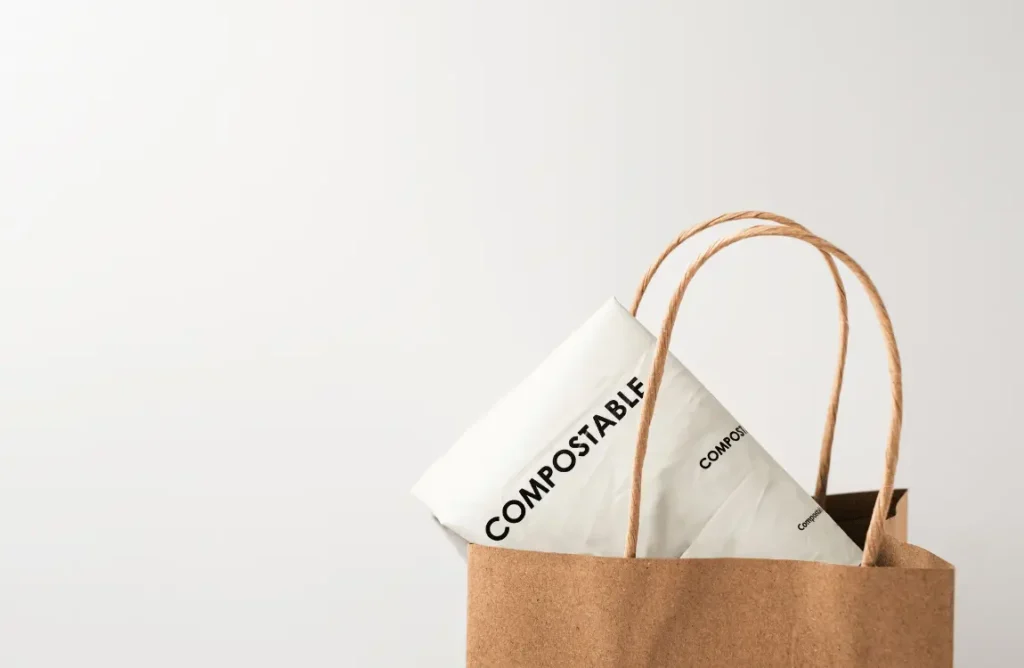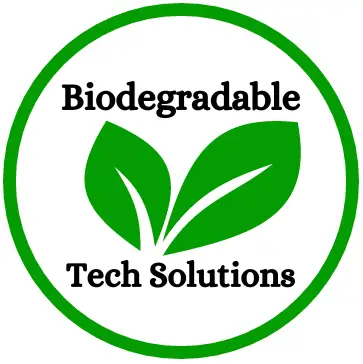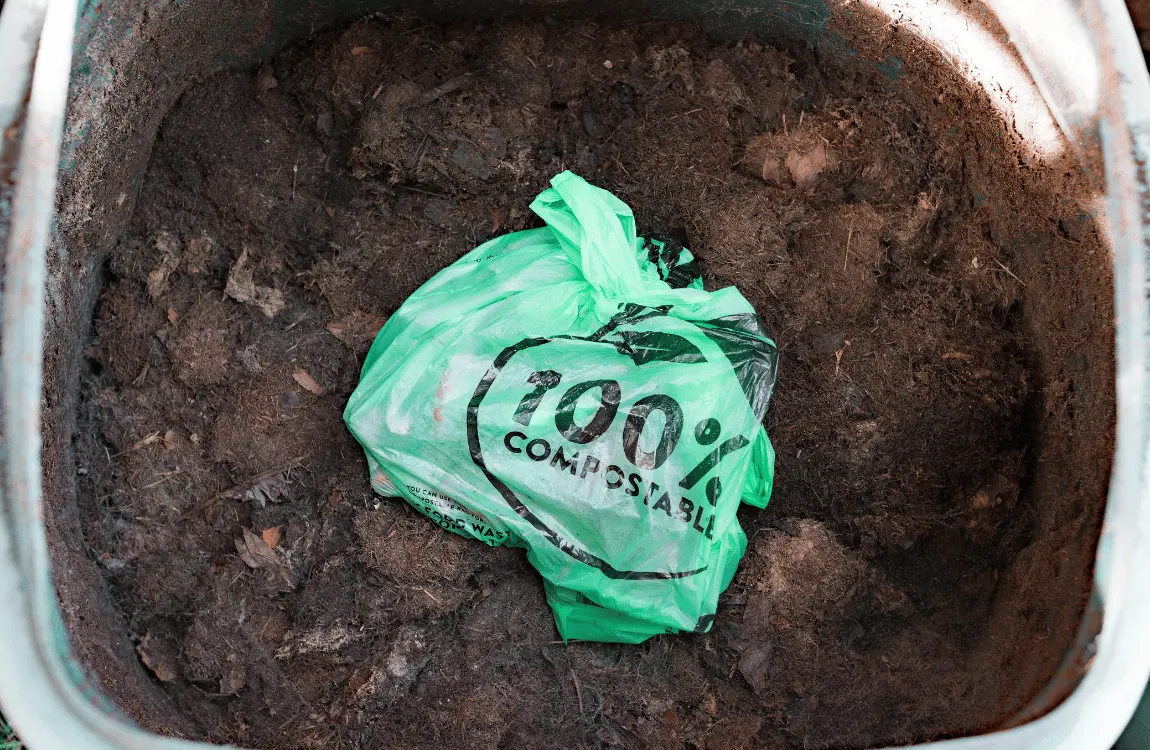Compostable plastic bags are designed to break down in composting environments. These bags help reduce plastic pollution by decomposing into organic matter.
Compostable plastic bags represent a green alternative to traditional plastic bags, aimed at mitigating plastic waste issues. Made primarily from plant-based materials such as corn starch, these bags are engineered to decompose under the right composting conditions. With the growing awareness of environmental impacts, consumers and businesses are turning to these eco-friendly options.
Compostable bags should decompose within a specified timeframe, typically within 90 to 180 days, in an industrial composting facility. Their use supports waste reduction efforts and contributes to a more sustainable approach to material disposal. For optimal environmental benefits, it’s essential to dispose of these bags correctly, ensuring they reach appropriate composting facilities to break down effectively.

The Rise Of Compostable Plastic Bags
As eco-consciousness sweeps the globe, compostable plastic bags are taking center stage. Environmentally friendly options are now in demand, steering a shift from traditional plastics. Compostable bags offer a sustainable alternative, aligning with the move to combat plastic pollution.
Understanding Compostable Materials
Compostable materials are planet-friendly substances that break down into natural elements. Microorganisms consume them within a specific period, typically 90 days under compost conditions. These materials turn into nutrient-rich soil, also known as humus.
- Compostables must disintegrate completely.
- They must be non-toxic, leaving no harmful residue.
- The result enriches the earth and supports plant growth.
The History And Evolution Of Compostable Bags
The journey of compostable bags began with the search for eco-friendly alternatives to plastic. The first patent for biodegradable plastic dates back to 1971. Advancements in technology have since transformed these early models into the high-quality compostable bags we see today.
| Decade | Innovation |
|---|---|
| 1970s | Introduction of biodegradable plastic. |
| 1990s | Improved materials and composting rates. |
| 2000s | Widespread commercial availability of compostable bags. |
| 2020s | Advancement in composting technologies and materials. |
This timeline highlights key milestones in developing today’s compostable plastic bags.
Distinguishing Between Biodegradable And Compostable
Biodegradable bags naturally break down over time but without a set timeframe. They might also leave microplastics behind. Compostable bags, however, disintegrate within a specified period and turn into non-toxic biomass.
- Biodegradable: Breaks down naturally; may leave a residue.
- Compostable: Breaks down within 90 days in compost conditions; becomes soil.
Benefits Of Using Compostable Plastic Bags
Plastic bags pose a serious threat to our planet. Compostable plastic bags offer a promising solution to this crisis. They are made from natural materials like cornstarch and break down over time. This reduces litter and harm to wildlife. Friendly to both the earth and future generations, they pack a punch of benefits. Let’s unwrap these benefits.
Environmental Impact Reduction
Compostable plastic bags lead to a healthier planet. They turn into water, carbon dioxide, and biomass quickly. This means they don’t linger for centuries like regular plastic. They also don’t release harmful toxins when they break down. By using compostable bags, you contribute to less pollution and a cleaner world. This effort supports a better balance in nature.
Advantages In Waste Management
- Easy to break down: Compostable bags decompose in compost facilities, making the process swift.
- Less landfill space: They occupy minimal space in landfills, reducing waste bulk.
- Supports composting: These bags can carry kitchen scraps to compost bins, aiding in organic waste management.
In waste management, compostable plastic bags simplify the process and promote eco-friendly practices.
Encouraging Sustainable Consumer Behaviors
Compostable bags influence how people think about the environment. They serve as a daily reminder of our eco-responsibilities. When people choose these bags, they often start to make other green choices. This ripple effect can spark a trend towards sustainability.
In summary, compostable plastic bags help our environment, improve waste management, and encourage green living. They are a simple choice with profound effects that resonate well beyond the checkout counter. Embrace these bags and join the movement toward a greener future.
Challenges And Considerations
While compostable plastic bags offer a greener alternative to traditional plastics, various hurdles stand in the way of their widespread adoption and effectiveness. These challenges relate to their production, usage, and disposal. Addressing these issues is critical for maximizing the bags’ environmental benefits. Let’s delve into the core challenges and considerations.
Technical Limitations And Durability Concerns
Compostable plastic bags are not identical to conventional ones regarding strength and storage. They are often sensitive to heat and moisture, which can limit their utility. A table highlighting the key differences helps provide a clear picture:
| Feature | Compostable Bags | Conventional Plastic Bags |
|---|---|---|
| Durability | Lower | Higher |
| Sensitivity to Environment | Yes | No |
| Storage Life | Shorter | Longer |
Proper Disposal And Composting Infrastructure
Even if bags are labeled compostable, they require specific conditions to break down. Many regions lack the necessary composting facilities. Disposing of these bags in the regular trash or recycling bins does not permit them to compost. Without proper infrastructure, their ecological benefits are nullified.
Consumer Awareness And Product Labeling Issues
Understanding the distinction between biodegradable and compostable is crucial. Misleading product labels can confuse consumers. Clear, standardized labeling is imperative to guide proper usage and disposal. Here, we list some common labeling terms and their meanings:
- Biodegradable: Breaks down naturally with bacteria, but the timeframe varies widely.
- Compostable: Breaks down into non-toxic components in a compost environment.
- Oxo-degradable: Requires specific conditions and may leave harmful residues.
Ensuring consumers recognize and understand these terms aids in optimal compliance and environmental stewardship.
Global Market And Innovations
The Global Market and Innovations in compostable plastic bags are reshaping how we think about sustainable packaging. With a rising demand for eco-friendly products, businesses and consumers alike are turning their attention to alternatives that promise a greener future. This exploration delves into the current trends, inventive materials, and the anticipated growth within a circular economy.
Current Market Trends For Compostable Bags
The global market for compostable bags is on an upward trajectory. In response to plastic pollution, various nations are enforcing regulations that favor compostable solutions. This shift steers manufacturers toward innovative, compostable bag options. The demand increases particularly in retail, agriculture, and food industries.
- Regulatory support bolsters market growth.
- Consumer awareness drives demand for sustainable packaging.
- Retailers adopt compostable bags to enhance their brand image.
Innovative Materials And Alternative Solutions
The compostable bag industry innovates constantly. Researchers and manufacturers explore materials like PLA (Polylactic Acid) and PHA (Polyhydroxyalkanoates) for better performance. Other solutions include bags made from plant starch or food waste.
| Material | Source | Properties |
|---|---|---|
| PLA | Corn starch | Biodegradable, strong |
| PHA | Microbial fermentation of sugars | Biodegradable, flexible |
| Starch-based | Potato, tapioca | Compostable, renewable |
Future Of Compostable Bags In A Circular Economy
Compostable bags play a pivotal role in achieving a circular economy. This concept focuses on keeping resources in use for as long as possible. Through composting, bags return to the earth, enriching the soil, and reducing waste.
- Bags decompose to produce valuable compost.
- Sustainable practices reduce plastic pollution.
- Innovation makes composting more efficient.
Policy And Certification
Policy and certification play pivotal roles in the realm of compostable plastic bags. These frameworks ensure that products meet specific environmental standards and facilitate a cohesive approach toward biodegradable materials. Understanding government legislation and certification benchmarks is essential for producers and consumers alike. Let’s delve into the regulatory landscape and standards that guide the compostable plastics industry.
Government Regulations On Compostable Plastics
The journey towards sustainability is marked by critical milestones in legislation. Governments worldwide are enacting policies to curb plastic pollution. These regulations aim to integrate compostable plastics into a greener economy. Rules vary by region, but common themes include:
- Usage restrictions on certain plastic products.
- Labelling requirements for clear identification.
- Standards for compostability to ensure proper breakdown.
For instance, the European Union’s stringent directives focus on reducing single-use plastics. Many member states now approve only plastics that can compost under specific conditions.
Certification Standards For Compostable Products
Certification bodies ensure that compostable plastic bags meet environmental safety criteria. To acquire certification, products must pass tests that examine:
- Biodegradability in composting environments.
- Disintegration during the composting process.
- Effects on the quality of the resulting compost.
- Concentration of heavy metals and toxins.
Certifications like BPI (Biodegradable Products Institute) in the USA or European Norm EN 13432 reflect compliance with these standards, offering guidance to consumers seeking eco-friendly options.
Balancing Industry Growth And Environmental Policy
The relationship between industrial growth and environmental preservation is delicate. The surge in compostable plastic bag demand presents opportunities and challenges. Policies must nurture innovation while safeguarding our planet. Table 1 illustrates the balance:
| Industry Growth | Environmental Policy |
|---|---|
| Incentives for producing eco-friendly bags. | Mandates for compostability standards. |
| Support for new sustainable materials research. | Restrictions on harmful plastics. |
| Creation of green jobs in the eco-industry. | Programs to educate the public on composting. |
Legislation incentivizes companies to adopt eco-friendly practices. Supportive policies help maintain a thriving balance between economic and environmental objectives.
Consumer Perspective And Adoption
Understanding how people view and use compostable plastic bags is key to their success. This shift to eco-friendly options must resonate with consumers. Let’s explore the public’s response and willingness to adopt these sustainable products. Ready?
Shifting Public Attitudes Toward Sustainable Products
Times are changing. People seek products that don’t harm the planet. This shift is clear with compostable plastic bags rising in popularity. Data shows a growing preference for environmentally conscious choices in shopping habits.
- 74% of consumers are willing to pay extra for sustainable packaging.
- Eco-friendly product sales grow 5.6 times faster than those that aren’t.
The Role Of Education In Promoting Compostable Bags
Educational efforts play a huge part in the rise of compostable bags. Campaigns and information drives help people understand the benefits and the proper use of these alternatives.
| Educational Focus | Impact |
|---|---|
| How compostable bags decompose | Increases consumer trust |
| Difference between biodegradable and compostable | Clarifies choices |
| Proper disposal methods | Ensures environmental benefit |
Case Studies: Success Stories And Challenges
Various case studies highlight both wins and hurdles. For instance, a grocery chain saw a 40% increase in demand for compostable bags after an awareness campaign. However, a key challenge remains: the limited composting facilities in many areas.
- Supermarket switches to compostable bags, sales jump.
- Community composting program boosts local adoption.
- The lack of composting sites leads to misuse of bags.
Real-world examples inspire and teach valuable lessons on what works and what needs improvement.
Frequently Asked Questions On Compostable Plastic Bags
What Are Compostable Plastic Bags?
Compostable plastic bags are designed to break down in composting environments. They’re made from plant-based materials like cornstarch, transforming into water, carbon dioxide, and biomass when composted properly.
How Long Do Compostable Bags Take To Degrade?
Compostable plastic bags typically degrade within 90 to 180 days in a proper composting facility. Home composting may take longer due to varying conditions.
Can You Recycle Compostable Plastic Bags?
Compostable plastic bags cannot be recycled with traditional plastics. They should be disposed of in a composting system to break down correctly and avoid contaminating the recycling stream.
Are Compostable Bags Better For The Environment?
Compostable bags are more eco-friendly than regular plastic bags as they are made from renewable resources and can break down into non-toxic elements, reducing plastic pollution and landfill waste.
Conclusion
As we strive for a greener planet, compostable plastic bags offer a promising path. They reduce landfill waste and aid in conserving resources. Embracing these eco-friendly alternatives showcases our commitment to sustainability. Let’s make the switch to support a healthier environment.
Remember, every small step counts. Choose compostable bags—choose a better future.







